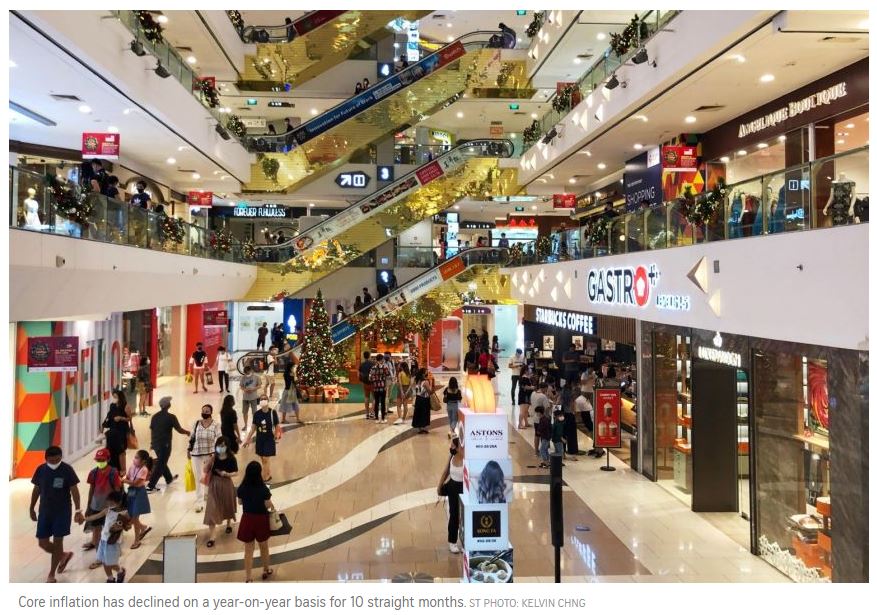Slower rate of decline in Singapore’s core and overall inflation in November
SINGAPORE – The decline in core consumer prices and overall inflation eased last month, according to data released by the Monetary Authority of Singapore (MAS) and the Ministry of Trade and Industry (MTI) on Wednesday (Dec 23).
Core inflation, which excludes accommodation and private road transport costs, came in at minus 0.1 per cent year on year last month, slightly above the minus 0.2 per cent seen in October.
Core inflation has declined on a year-on-year basis for 10 straight months.
The continued fall in prices is the longest since 1991, the earliest period for which percentage changes on core inflation data are available on the Singapore Department of Statistics website.
Singapore’s core prices previously fell for nine consecutive months during the global financial crisis in 2008 and 2009.
Meanwhile, overall inflation also rose to minus 0.1 per cent, from minus 0.2 per cent the previous month.
Market expectations for core inflation to be minus 0.1 per cent last month were right on the money, according to a median forecast of seven economists polled by Reuters.
Headline inflation outshone their expectations of a 0.2 per cent drop.
The slower rate of decline in prices last month was mainly due to a smaller fall in the costs of services and electricity and gas, as well as higher food inflation.
Private transport and accommodation inflation stayed broadly unchanged compared with October.
Private transport costs fell at the same pace of 1.3 per cent as a larger increase in car prices was offset by a sharper fall in petrol costs.
Electricity and gas costs fell more modestly at 6.8 per cent, compared with the 7.2 per cent decline the previous month, as targeted utilities rebates ceased in October.
Services costs also registered a more moderate fall of 0.2 per cent in November, compared with the 0.5 per cent decline the previous month, largely due to a smaller decrease in outpatient services fees and an increase in the costs of recreational and cultural services.
The cost of retail and other goods fell more sharply at 2 per cent, compared with a 1.6 per cent decline in October, due to a larger decline in clothing and footwear prices and a slower pace of increase in household durable costs.
Meanwhile, food inflation edged up in November, at 1.8 per cent compared with 1.7 per cent the previous month, mainly due to a steeper rise in the prices of non-cooked food and restaurant meals.
Accommodation inflation was unchanged at 0.3 per cent as housing rents rose at a similar pace as in October.
MAS and MTI said external inflation is likely to remain low in the quarters ahead amid weak demand conditions in key commodity markets and a persistence of spare capacity in Singapore’s major trading partners.
Cost pressures are also expected to stay subdued locally, with the accumulated slack in the labour market dampening wages.
However, core inflation is forecast to turn “mildly positive” next year, with demand for some domestic services gradually picking up and the disinflationary effects of government subsidies introduced this year fading.
“Meanwhile, accommodation costs are expected to fall as rentals could soften, due in part to the decline in foreign employment,” said MAS and MTI.
“In comparison, private transport costs should rise modestly amid an anticipated reduction in the supply of certificates of entitlement (COEs) in 2021,” they added.
MAS and MTI reiterated their core and overall inflation forecast of between minus 0.5 per cent and 0 per cent this year.
Core inflation is expected to average between 0 and 1 per cent next year, while overall inflation is forecast to be between minus 0.5 and 0.5 per cent.
Source: https://www.straitstimes.com/business/economy/singapores-core-and-overall-inflation-ease-in-november


 Thailand
Thailand




